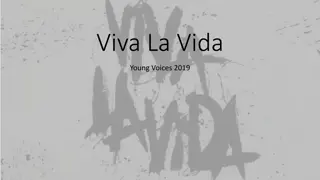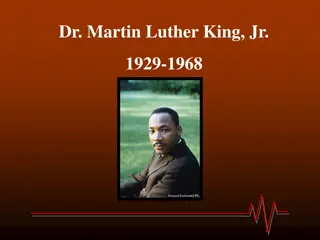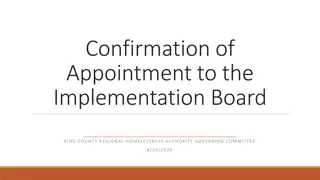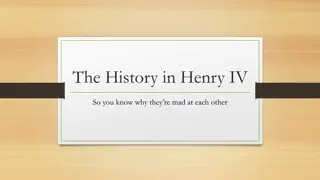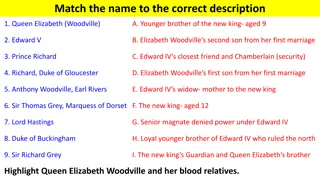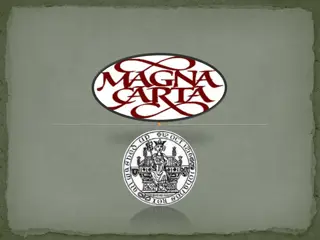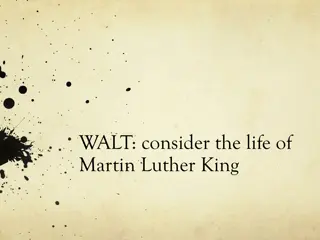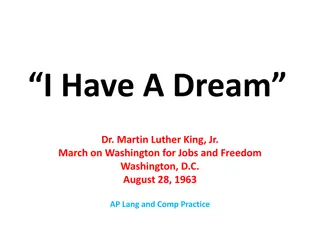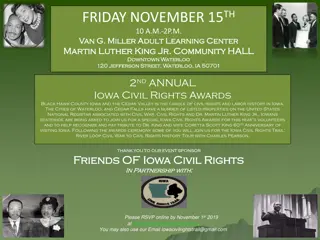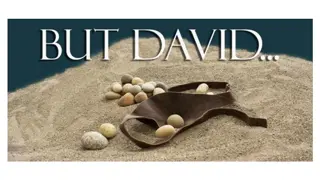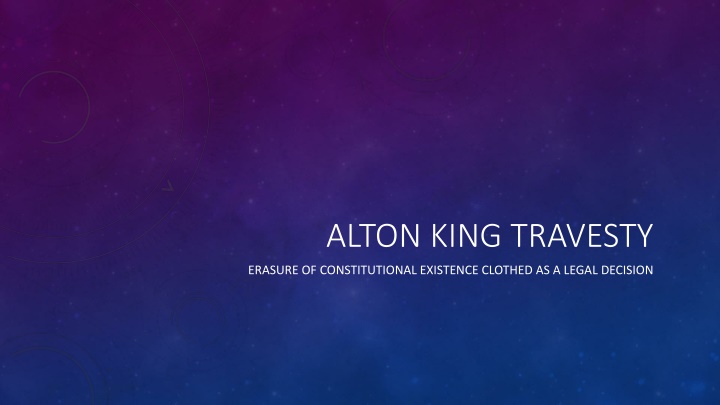
Constitutional Rights and Judicial Reversal: Alton King Travesty Exposed
Discover the unsettling case of Alton King's constitutional rights being stripped away by legal decisions, leading to a complete reversal in the function of the Supreme Judicial Court. Explore the fundamental principles of constitutional guarantees, the right to defend property, and the historic 1783 Commonwealth v. Jennison ruling recognizing equal property rights for all, irrespective of color or complexion.
Download Presentation

Please find below an Image/Link to download the presentation.
The content on the website is provided AS IS for your information and personal use only. It may not be sold, licensed, or shared on other websites without obtaining consent from the author. If you encounter any issues during the download, it is possible that the publisher has removed the file from their server.
You are allowed to download the files provided on this website for personal or commercial use, subject to the condition that they are used lawfully. All files are the property of their respective owners.
The content on the website is provided AS IS for your information and personal use only. It may not be sold, licensed, or shared on other websites without obtaining consent from the author.
E N D
Presentation Transcript
ALTON KING TRAVESTY ERASURE OF CONSTITUTIONAL EXISTENCE CLOTHED AS A LEGAL DECISION
HELD: CONSTITUTIONAL STRIPPING OF RIGHTS Even given that King was found legally indigent he needed extra fees waived or would have to give up life necessities (threaten his survival) to prosecute his case. Guarantee of being able to equally prosecute as would someone with money Even given that King s defense was found meritorious: challenge to the Plaintiff s claim to title/ownership of the property, and thus standing to commence eviction case and Housing Court s subject matter jurisdiction Court held that even with awareness that Plaintiff may well have broken laws and have no right to bring this case nor to receive any decision in this case (including for money from King), that King must endanger his life paying or the Court would not enforce his Constitutional protections.
COMPLETE REVERSAL CONSTITUTION/FUNCTION OF SUPREME JUDICIAL COURT Commonwealth v. Jennison (3rdQuock Walker case) (1783) established foundational principles: Constitutional guarantees apply to all (regardless of color, complexion ) as to Liberty and Life and Property Constitutional guarantees supersede statutes ( It is a proposition too plain to be contested that the Constitution controls any legislative act repugnant to it, The Constitution is either a superior, paramount law, unchangeable by ordinary means, ... If the former part of the alternative be true, then a legislative act contrary to the Constitution is not law; an act of the Legislature repugnant to the Constitution is void. Marbury v. Madison, 5 U.S. 137 (1803)) Function of Highest Court is to interpret/enforce constitution ( The question whether a right has vested or not is, in its nature, judicial, and must be tried by the judicial authority. The Constitution vests the whole judicial power of the United States in one Supreme Court, ... This power is expressly extended to all cases arising under the laws of the United States; Marbury v. Madison, 5 U.S. 137 (1803)) Plaintiff must have a legal remedy by action at law within the subject matter jurisdiction of the court in question: in other words Plaintiff must have standing. ("it is a general and indisputable rule that where there is a legal right, there is also a legal remedy by suit or action at law whenever that right is invaded. Marbury v. Madison, 5 U.S. 137 (1803) Alton King has right to defend his inalienable rights to his property (Article I, Amendment CVI) and his substantive right to access to the courts (Article XI), without forgoing the necessities of life (Article XI) and access to a jury trial in controversies over property (Article XV). ("it is a general and indisputable rule that where there is a legal right, there is also a legal remedy by suit or action at law whenever that right is invaded. Marbury v. Madison, 5 U.S. 137 (1803)
1783 EVEN SLAVES HELD TO HAVE EQUAL PROPERTY RIGHTS (COMMONWEALTH V. JENNISON) Commonwealth V. Jennison (Massachusetts, 1783, Unreported), a/k/a the 3rd Quock Walker decision, But whatever sentiments have formerly prevailed in this particular or slid in upon us by example of others, a different idea has taken place with the people of America, more favorable to the natural rights of mankind, and to that natural, innate desire of Liberty, with which Heaven (without regard to color, complexion, or features) has inspired all the human race. And upon this ground our Constitution of Government, by which the people of this Commonwealth have solemnly bound themselves, sets out with declaring that all men are born free and equal -- and that every subject is entitled to liberty, and to have it guarded by the laws, as well as life and property -- and in short is totally repugnant to the idea of being born slaves. This being the case, I think the idea of slavery is inconsistent with our own conduct and Constitution; and there can be no such thing as perpetual servitude of a rational creature, unless his liberty is forfeited by some criminal conduct or given up by personal consent or contract . [Emphasis added.]
APPELLATE REVIEW Higher Courts must review standing Threshold issue Always applicable Sua sponte if no defendant De Novo when all documentary evidence De Novo when summary judgment (Zielinski v. Connecticut Valley Sanitary Waste Disposal, Inc.)
GIVEN THE FACTS OF THIS CASE Misstated facts (Identity and type of Plaintiff, entirely fictional and vague legislative histories) Facts never included in a foreclosure-related or eviction-related decision before ($1 million dollar home it should be noted that, in fact, King was quoted that the house was worth $1.5 million when the mortgaging industry sold him two loans for a total of $1,433K trapping him under water the day got thwe loans). Unsupportable facts where evidence readily available in the record shows it is not true (not a mortgage, not an assignment, not a foreclosure, not a notice sent pursuant to 35A 35B mortgage ) Facts that minimal inquiry in the public record shows were not facts (Trust 2006-J7 does not exist, no assignor for assignment) Mischaracterization ( Bank instead of Securitized Trust, referring to Plaintiff as purchaser instead of mortgagee who must demonstrate authority and jurisdiction without which the foreclosure is void.) Includes prejudicial, irrelevant facts (description of million-dollar property)
LEGISLATIVE INTERPRETATION FICTION/VIOLATIONS Mischief to address (Rugg interpretation at time of 186-3/239-6) Intent via legislative progression Intent to all words Plain meaning of words ends judicial inquiry If not plain, then technical meaning at the time Don t add words intentionally left out Avoid overly broad Harmonious in this case, counterpoint Avoid absurd result Constitutional protections override statutes
EXACTLY WHAT SJC CANNOT DO STATUTORY INTERPRETATION ABCD, INC. v. Commissioner of Public Welfare, 378 Mass. 327 (1979): The proposed remedy in this case would not simply permit a part of a statute to be effective when another part cannot be. Rather, it would tear down a consciously erected legislative barrier and thus allow the limited legislative purpose to escape into the very area from which it was to have been excluded. A conclusion that the Legislature would have intended such a result cannot be justified in this instance. See Massachusetts Pub. Interest Research Group v. Secretary of the Commonwealth, 375 Mass. 85, 91 (1978). This Alton King decision explicitly ignores the statutory language of the clause in the statute (Chapter 239 5) this decision relies upon, which clause explicitly bars 5 s applicability to the statute for homeowners in purported post-foreclosure eviction cases (chapter 239 6).
SELECTED LEADING CASELAW OVERRULED Adjartey Hatcher Ibanez Eaton Bevilacqua Rosa Matt Fremont Reade v. Sec of State Comerford Moore v. Dick Marbury v. Madison Commonwealth v. Jennison
JUDICIAL REVIEW STANDARDS ERADICATED Litigant must have legal existence Standing (Matt) Standing as threshold issue Factual Challenge to Standing (Abate) Standing as sua sponte obligation of all courts (Matt, Hatcher) Strict Compliance/Utmost Diligence & Strictest Good Faith (Ibanez, Resolute) Voidness by operation of law Plaintiff has burden of proof De Novo review of Summary Process De Novo review when all evidence documentary Preliminary Injunction Standard (Packaging Industries) Maxims of Equity
SJC CONJURED UP NOVEL FAIR BALANCING TEST INSUPPORTIBLE UNDER MAXIMS OF EQUITY Court can only assert equity jurisdiction only where no remedy at law (i.e., Indigent Court Costs Statutes (waiver & challenge), purchaser s remedy against seller not homeowner, deficiency statute) Equity will not suffer a wrong without a remedy (i.e. equity will not allow a person whom it considers as having a good claim to be denied the right to sue); Equity looks to substance and not the form; Equity follows the law (i.e. equity follows the rules of common law unless there is a good reason to the contrary); Where the equities are equal, the earlier in time prevails (i.e., where rights are equal in worth or value, the earlier right created takes precedence over the later); Whoever seeks equity must do equity; Whoever comes to equity must come with clean hands (see equitable remedies); Equality is equity; Equity looks on that as done which ought to be done (see conversion); Equity will not assist a volunteer (see voluntary settlement).
ELEMENTS OF NOVEL FAIR BALANCING TEST NOT LEGALLY POSSIBLE Implied standard would be Preliminary Injunction Standard (4 prong test) Actual Basis applied: (i) Defendant could not afford mortgage (ii) will not be able to afford U&O though less than the mortgage payment (iii) therefore, the bank will have no choice but to re-foreclose. Elements of Novel Test : Fair rental value of the property, (despite actual conditions in the property) The merits of the defense, Length of not paying mortgage, (mortgage had been extinguished at option of the mortgagee; remedy at law is the deficiency statue, MGL Chapter 244 17A) The real estate taxes on the property, Expected duration of the litigation, (so if you ask for Jury Trial it is more ok to be priced out of litigating at all/no control over how the Plaintiff delays the case) Relative financial conditions (i.e., richer party gets financial benefit)
IMPOSITION OF RENTAL CONTRACT WHERE NO LEGAL RELATIONSHIP EXISTED Jurisprudence: payment of rent creates tenancy Parties are legal strangers after extinguishing mortgage court cannot impose a contractual relationship
DECISION CANNOT BE MAINTAINED, IT VIOLATES MASS EQUAL RIGHTS AMENDMENT/14THAMENDMENT The structural racism of the Mortgaging Industry is well-established and yet, the SJC refused to scrutinize any violations of rights of a homeowner who could not pay for the courts attention carving out an exception from constitutional rights of all homeowners. Based on racism Based on new suspect class homeowners after foreclosure Court has before it all the evidence that each element of its decision was not legally possible but it threw out all applicable jurisprudence to reach this decision. This includes the Constitutional function of the Court, separation of powers, and the Constitution itself.
CAN COURT DENY LEGAL PROTECTIONS PROTECTING LIFE? Admitted that King was legally indigent, would by definition have to forego necessities of life in other words, he must choose between pursuing his Constitutional Right to Court or to Life COVID comment footnote 12





